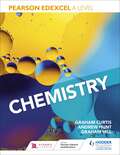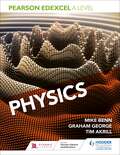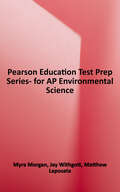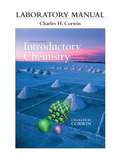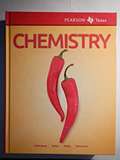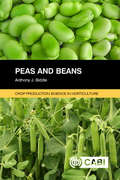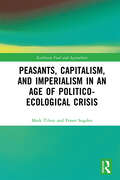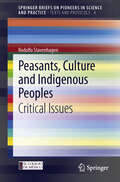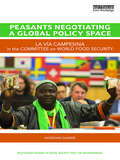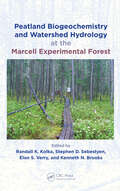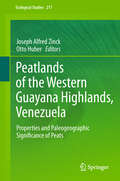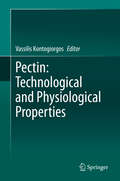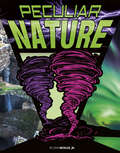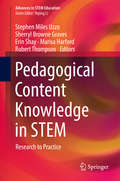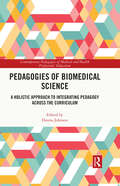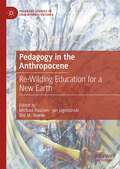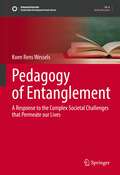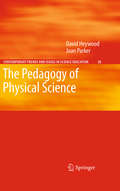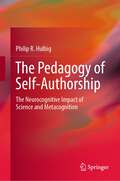- Table View
- List View
Pearson Edexcel A Level Chemistry (Year 1 and Year 2)
by Andrew Hunt Graham Curtis Graham HillDevelop and assess your students' knowledge and skills throughout A level with worked examples, practical assessment guidance and differentiated end of topic questions in this updated, all-in-one textbook for Years 1 and 2. Combining everything your students need to know for the Pearson Edexcel A level Chemistry specification, this revised textbook will:- Identify the level of your students' understanding with diagnostic questions and a summary of prior knowledge at the start of the Student Book.- Provide support for all 16 required practicals with various activities and questions, along with a 'Practical' chapter covering procedural understanding and key ideas related to measurement.- Improve mathematical skills with plenty of worked examples, including notes on methods to help explain the strategies for solving each type of problem.- Offer plenty of practice with 'Test yourself' questions to help students assess their understanding and measure progress.- Encourage further reading and study with short passages of extension material.- Develop understanding with free online access to 'Test yourself' answers and an extended glossary.
Pearson Edexcel A Level Chemistry (Year 1 and Year 2)
by Andrew Hunt Graham Curtis Graham HillDevelop and assess your students' knowledge and skills throughout A level with worked examples, practical assessment guidance and differentiated end of topic questions in this updated, all-in-one textbook for Years 1 and 2. Combining everything your students need to know for the Pearson Edexcel A level Chemistry specification, this revised textbook will:- Identify the level of your students' understanding with diagnostic questions and a summary of prior knowledge at the start of the Student Book.- Provide support for all 16 required practicals with various activities and questions, along with a 'Practical' chapter covering procedural understanding and key ideas related to measurement.- Improve mathematical skills with plenty of worked examples, including notes on methods to help explain the strategies for solving each type of problem.- Offer plenty of practice with 'Test yourself' questions to help students assess their understanding and measure progress.- Encourage further reading and study with short passages of extension material.- Develop understanding with free online access to 'Test yourself' answers and an extended glossary.
Pearson Edexcel A Level Physics (Year 1 and Year 2)
by Mike Benn Tim Akrill Graham GeorgeHelp students to develop their knowledge and build essential skills with practical assessment guidance and plenty of support for the new mathematical requirements in this updated, all-in-one textbook for Years 1 and 2.Combining everything your students need to know for the Pearson Edexcel A level Physics specification, this revised textbook will:- Support practical assessment with practical skill summaries throughout.- Provide support for all 16 required practicals with detailed explanations, data and exam style questions for students to answer.- Build understanding and knowledge with a variety of questions to engage and challenge students throughout the course: prior knowledge, worked examples, 'Test yourself' and exam practice questions.- Aid mathematical understanding and application with worked examples of calculations and a dedicated 'Maths for Physics' chapter.- Develop understanding and enable self- and peer-assessment with free online access to 'Test yourself' answers.
Pearson Edexcel A Level Physics (Year 1 and Year 2)
by Mike Benn Tim Akrill Graham GeorgeHelp students to develop their knowledge and build essential skills with practical assessment guidance and plenty of support for the new mathematical requirements in this updated, all-in-one textbook for Years 1 and 2.Combining everything your students need to know for the Pearson Edexcel A level Physics specification, this revised textbook will:- Support practical assessment with practical skill summaries throughout.- Provide support for all 16 required practicals with detailed explanations, data and exam style questions for students to answer.- Build understanding and knowledge with a variety of questions to engage and challenge students throughout the course: prior knowledge, worked examples, 'Test yourself' and exam practice questions.- Aid mathematical understanding and application with worked examples of calculations and a dedicated 'Maths for Physics' chapter.- Develop understanding and enable self- and peer-assessment with free online access to 'Test yourself' answers.
Pearson Education Test Prep Series for AP Environmental Science
by Myra MorganOf all of the AP science courses, AP Environmental Science is unique in that it focuses primarily on the relevant and pressing problems that face our species and the planet. It is an applied science that focuses on problem-solving, understanding environmental issues by emphasizing critical thinking, and encouraging you to propose possible solutions by immersing yourself in the science behind the issues. Laboratory and field investigations also form an essential component of the course, as these experiences afford critical insights into how science is practiced, how environmental problems are studied, and how humans worldwide are affecting their environment.
Pearson Laboratory Manual for Introductory Chemistry: Concepts And Critical Thinking, Sixth Edition
by Charles H. CorwinEmphasizing environmental considerations, Corwin's lab manual offers a proven format of a prelaboratory assignment, a stepwise procedure, and a postlaboratory assignment. The Sixth Edition features a completely updated interior design, new environmental icons denoting "green" features, updated prelabs, and much more.
Pearson Physical Science: Concepts in Action with Earth and Space Science
by Sophia Yancopoulos David Frank Michael WysessionTextbook on physical science.
Pearson Physics
by James VaikerThe 2014 edition of the popular physics textbook series. Every class contains a unique and diverse group of students. Pearson Physics supports each student's unique learning style, offering all students a path to success.
Pearson Texas Chemistry
by Dennis Staley Antony Wilbraham Edward Waterman Dr Michael MattaPearson Chemistry was customized especially for Texas! Covering 100% of the Texas Essential Knowledge and Skills for Chemistry, this program was built on feedback from Texas educators. Pearson Texas Chemistry focuses on what is important to Texas teachers and students, creating a truly accessible program for all students and an engaging classroom experience. Pearson would like to extend a special thank you to all of the teachers from across the state of Texas who helped guide the development of this program.
Peas and Beans: A Color Handbook (Crop Production Science in Horticulture)
by Anthony J BiddleThis practical book provides an accessible overview of all aspects of pea and bean production, including botany and physiology, breeding, agronomy, weed management, pests and diseases, harvesting, nutritional value and uses. It also reflects on the constraints and opportunities in the future for peas and beans, exploring their role in food sustainability and crop rotation, and various factors affecting supply and demand such as climate change and breeding technologies. Peas and beans are crops of economic, social and agronomic importance and this volume provides the specialist knowledge needed to ensure good quality standards are met. It includes: · coverage of the main types of peas and beans grown on a significant scale or commercially produced in large area farming; · key information relating to the role of peas and beans in biological nitrogen fixation; · extensive coverage from the technology of cultivation to postharvest industry; and · high-quality photos, presented in full colour throughout. Authored by a recognized authority with extensive experience in applied research, this book is an ideal resource for practical agronomists, advisors and producers, extension workers, horticulture students and all those involved in the production of peas and beans.
Peasants, Capitalism, and Imperialism in an Age of Politico-Ecological Crisis (Earthscan Food and Agriculture)
by Mark Tilzey Fraser SugdenThis book utilises a new theoretical approach to understand the dynamics of the peasantry, and peasant resistance, in relation to capitalism, state, class, and imperialism in the global South. In this companion volume to Peasants, Capitalism, and the Work of Eric R. Wolf, the authors further develop their thinking on agrarian transitions to capitalism, the development of imperialism, and the place of the peasantry in these dynamics, with special reference to the global South in an era of politico-ecological crisis. Focusing on the political role of the peasantry in contested transitions to capitalism and to modes of production outside of, and beyond, capitalism, the book contends that an understanding of these dynamics requires an analysis of class struggle and of the resources, material and discursive, that different classes can bring to bear on this struggle. The book focuses on the rise of capitalism in the global South within the context of imperial subordination to the global North, and the place of the peasantry in shaping and resisting these dynamics. The book presents case studies of contested transitions to agrarian capitalism in Bolivia, Ecuador, Guatemala, Mexico, Peru, and South Asia. It also examines the case of transition to a post-capitalist mode of production in Cuba. The book concludes with an assessment of the nature of capitalism and imperialism within the context of the contemporary politico-ecological crisis, and the potential role of the peasantry as agent of emancipatory change towards social and environmental sustainability. This book will be of great interest to students and researchers in the areas of peasant studies, rural politics, agrarian studies, development, and political ecology.
Peasants, Culture and Indigenous Peoples
by Rodolfo StavenhagenThis last volume in a trilogy published on the occasion of the 80th birthday of Rodolfo Stavenhagen, professor emeritus of El Colegio de Mexico, includes eight essays on Peasants, Culture and Indigenous Peoples: Critical Issues; Basic Needs, Peasants and the Strategy for Rural Development (1976); Cultural Rights: a Social Science Perspective (1998); The Structure of Injustice: Poverty, Marginality, Exclusion and Human Rights (2000); What Kind of Yarn? From Color Line to Multicolored Hammock: Reflections on Racism and Public Policy (2001); The United Nations Special Rapporteur on the Rights of Indigenous Peoples (2012); A Report on the Human Rights Situation of Indigenous Peoples in Asia (2007); Report on the Impact of Megaprojects on the Rights of Indigenous Peoples (2003); and Study Regarding the Best Practices to Implement the Recommendations of the Special Rapporteur (2007). These texts address human rights issues, especially those that arose when Stavenhagen was servinged as United Nations special rapporteur on the rights of indigenous peoples.
Peasants Negotiating a Global Policy Space: La Vía Campesina in the Committee on World Food Security (Routledge Studies in Food, Society and the Environment)
by Ingeborg GaardeBeing the public voice of over 180 member organisations across nearly 90 countries, La Vía Campesina, the global peasant movement, has planted itself firmly on the international scene. This book explores the internationalisation of the movement, with a specific focus on the engagement of peasants in the processes of the Committee on World Food Security (CFS). Since the reform of the CFS in 2009, civil society actors engage in the policy processes of this UN Committee from a self-designed and autonomous global Civil Society Mechanism. The author sheds light on the strategies, tensions, debates, and reconfigurations arising from rural actors moving between every day struggles in the fields and those of the UN arena. Whereas most theories in the dominant literature on social movements expect them to either disappear or institutionalise in a predetermined pattern, the book presents empirical evidence that La Vía Campesina is building a much more sophisticated model. The direct participation of representatives of peasant organisations in the CFS is highlighted as a pioneering example of building a more complex, inclusive and democratic foundation for global policy-making. Foreword by Olivier De Schutter, United Nations Special Rapporteur on the Right to Food (2008-2014).
Peatland Biogeochemistry and Watershed Hydrology at the Marcell Experimental Forest
by Randall K. Kolka Stephen D. Sebestyen Elon S. Verry Kenneth N. BrooksThe Marcell Experimental Forest (MEF) in Minnesota serves as a living laboratory and provides scientists with a fundamental understanding of peatland hydrology, acid rain impacts, nutrient and carbon cycling, trace gas emissions, and controls on mercury transport in boreal watersheds. Its important role in scientific research continues to grow as t
Peatlands of the Western Guayana Highlands, Venezuela
by Joseph Alfred Zinck Otto HuberThe Guayana Highlands in northeastern tropical America, rising from lowland rain forests and savannas up to 3000 m elevation, are characterized by ancient tablelands called tepuis. The peatlands that developed on the tepuis constitute unique and fascinating ecosystems and are the focus of this volume, which starts with an overview of tropical and subtropical peats, followed by an introduction to the geo-ecological features of the Guayana region as a whole, with special emphasis on the diversity of the vegetation cover from lowlands to uplands to highlands. The core subject centers on the properties and dating of the peat deposits and the interpretation of the chronological record in terms of past environmental changes. The well illustrated book will appeal to a broad range of scientists interested in tropical highland peats, including quaternarists, soil scientists, geomorphologists, geographers, geologists, ecologists, botanists, hydrologists, conservationists, and land use planners.
Pectin: Technological and Physiological Properties
by Vassilis KontogiorgosThis text presents the technological and physiological properties of pectin in an educational approach that encompasses all of the essential information a researcher needs to fully understand their function and use in foods. Utilizing basic information on pectin as well as recent technological advances, this book is designed to be the primary resource for individuals seeking out an up to date reference work covering all the necessary informational and functional aspects of pectin. Pectin: technological and physiological properties is the first book to fully focus on the introductory concepts on pectin. Individual chapters cover localization and function, the structural aspects of pectin, pectinases, isolation and characterization and recovery from agricultural wastes. Important current advances such as emulsions, films, digestion, metabolism and bioactive properties are also focused on. With its combination of vital basic information and technological advances, this book presents full and up to date coverage on this pectin and its many forms and uses in foods.
Peculiar Nature (Anything But Ordinary)
by John Micklos Jr.The natural world can be a beautiful and awesome place. But sometimes things happen naturally that are quite peculiar. Have you heard of Blood Falls in Antarctica? Ice cold water flows bright red out of a glacier. Did you know that Death Valley National Park in California has boulders that mysteriously slide across the desert? Learn the details of these mysteries and other peculiar natural phenomena.
Peculiar Primates: Fun Facts About These Curious Creatures
by Debra Kempf ShumakerFrom flossing and howling, to building nests and thumping chests, this delightful follow up to Freaky, Funky Fish explores the amazing things primates do. All primates climb and breathe in air. They have big brains and hands and hair. But. . . some live alone, some live in groups. One primate has a nose that droops. Peculiar Primates is an adorable picture book with a scientific—and child-friendly—underpinning. With examples of different primates for each description, as well as extensive backmatter explaining the fascinating science behind their behaviors, this bizarre book captures the wonders of our ecosystem.
Pedagogical Content Knowledge in STEM: Research to Practice (Advances in STEM Education)
by Stephen Miles Uzzo Sherryl Browne Graves Erin Shay Marisa Harford Robert ThompsonThis volume represents both recent research in pedagogical content knowledge (PCK) in science, technology, engineering and math (STEM), as well as emerging innovations in how PCK is applied in practice. The notion of “research to practice” is critical to validating how effectively PCK works within the clinic and how it can be used to improve STEM learning. As the need for more effective educational approaches in STEM grows, the importance of developing, identifying, and validating effective practices and practitioner competencies are needed. This book covers a wide range of topics in PCK in different school levels (middle school, college teacher training, teacher professional development), and different environments (museums, rural). The contributors believe that vital to successful STEM education practice is recognition that STEM domains require both specialized domain knowledge as well as specialized pedagogical approaches. The authors of this work were chosen because of their extensive fieldwork in PCK research and practice, making this volume valuable to furthering how PCK is used to enlighten the understanding of learning, as well as providing practical instruction. This text helps STEM practitioners, researchers, and decision-makers further their interest in more effective STEM education practice, and raises new questions about STEM learning.
Pedagogies of Biomedical Science: A Holistic Approach to Integrating Pedagogy Across the Curriculum (Contemporary Pedagogies of Medical and Health Professions’ Education)
by Donna JohnsonThis book confronts the continually evolving nature of biomedical science education by providing a robust account of learning pedagogies and best practice for scholars and researchers in the field.Rather than considering subdisciplines of biomedical science education separately, the volume takes a holistic approach and considers the complexities of teaching biomedical science as a whole, providing a nuanced overview of how a particular practice fits in such a course overall, as well as providing support for development within the reader’s own subdiscipline. Ultimately, this holistic approach allows for expansive discussion of relevant pedagogical approaches that will directly inform innovations in the contemporary teaching of biomedical science education.Novel in approach and underpinned by the latest in research innovations, this book will appeal to scholars, researchers and postgraduate students in the fields of medical education, higher education, and curriculum studies. Policy makers involved with health education and promotion as well as educational research will also benefit from the volume.
Pedagogy in the Anthropocene: Re-Wilding Education for a New Earth (Palgrave Studies in Educational Futures)
by Jan Jagodzinski Michael Paulsen Shé M. HawkeThis book explores new pedagogical challenges and potentials of the Anthropocene era. The authors argue that this new epoch, with an unstable climate, new kinds of globally spreading viruses, and new knowledges, calls for a new way of educating and an alertness to new philosophies of education and pedagogical imaginations, thoughts, and practices. Addressing the linkages between the Anthropocene and Pedagogy across a broad pedagogical spectrum that is both formal and informal, the editors and their contributors emphasize a re-imagining of education that serves to deepen our understanding of the capacities and values of life.
Pedagogy of Entanglement: A Response to the Complex Societal Challenges that Permeate our Lives (Sustainable Development Goals Series)
by Koen Rens WesselsIn this hyperconnected, dynamic world we live in, permeated by profound challenges and transformations, the awareness of complexity is unequivocally on the rise. This monograph argues that it is high time that our educational institutions and pedagogical approaches come to mirror this growing awareness, to assist and inspire humanity to embrace complexity, to learn to move within it with increasing sensitivity and wisdom. Doing so is necessary, for if there is one thing that the years behind us bear witness of, it is that the tendency and attempt to simplify, separate, control, and indeed exploit has – as the dark side of the advancements of modern life – brought upon us unprecedented ecological and humanitarian crises. Schools, notably, are not closed spaces separated from society but open places within society, and as such they are inevitably complicit in the (re)shaping of our shared world. This book, therefore, proposes an ambitious pedagogical agenda. Specifically, it explores the relational ontological premise of entanglement in the context of pedagogical theory, raising the question of how, as teachers, we might meaningfully and responsibly engage with the myriad ways in which students are simultaneously shaped-by and shapers-of contemporary societal challenges. In close collaboration with twelve teachers as co-researchers, the book offers six ''helpful perspectives'' for teachers seeking to embrace such complexity in their own practices, referred to as: (1) entanglement-orientedness, (2) entanglement-awareness, (3) hopeful action, (4) inquiry within entangled phenomena, (5) practicing perceptiveness, and (6) practicing integrity.
The Pedagogy of Physical Science
by Joan Parker David HeywoodIn the science classroom, there are some ideas that are as difficult for young students to grasp as they are for teachers to explain. Forces, electricity, light, and basic astronomy are all examples of conceptual domains that come into this category. How should a teacher teach them? The authors of this monograph reject the traditional separation of subject and pedagogic knowledge. They believe that to develop effective teaching for meaningful learning in science, we must identify how teachers themselves interpret difficult ideas in science and, in particular, what supports their own learning in coming to a professional understanding of how to teach science concepts to young children. To do so, they analyzed trainee and practising teachers' responses to engaging with difficult ideas when learning science in higher education settings. The text demonstrates how professional insight emerges as teachers identify the elements that supported their understanding during their own learning. In this paradigm, professional awareness derives from the practitioner interrogating their own learning and identifying implications for their teaching of science. The book draws on a significant body of critically analysed empirical evidence collated and documented over a five-year period involving large numbers of trainee and practising teachers. It concludes that it is essential to 'problematize' subject knowledge, both for learner and teacher. The book's theoretical perspective draws on the field of cognitive psychology in learning. In particular, the role of metacognition and cognitive conflict in learning are examined and subsequently applied in a range of contexts. The work offers a unique and refreshing approach in addressing the important professional dimension of supporting teacher understanding of pedagogy and critically examines assumptions in contemporary debates about constructivism in science education.
The Pedagogy of Self-Authorship: The Neurocognitive Impact of Science and Metacognition
by Philip R. HulbigThis book is a deep dive into the developmental and neurocognitive impact of metacognition and its role in self-transformation. It connects the latest science on learning, neuroplasticity, and self-development with the rich history of metacognitive educational practices, creating an educational vision capable to address difficult issues faced by modern education.This vision highlights self-regulation, self-authorship, and self-transformation as the key learning goals of a free and equitable education system. This model of education is grounded in science, problem solving and is capable of addressing the needs of a neurologically diverse humanity. Interviews from experts at Program for the Advancement of Learning (PAL) are integrated with the author’ autobiographical account of their transformative learning experience, to provide evidence on the effectiveness of utilizing a metacognitive pedagogy in promoting transformative learning.The book concludes with a general pedagogy of metacognitive instruction that integrates the scientific method with the development of an individual's theory of mind to induce expansive personal development and achievement. This book would be of interest to educators and scholars, as well as practitioners supporting neurodivergent students and employees, neurodiversity advocates, and critical disability studies researchers.
